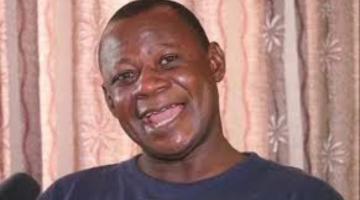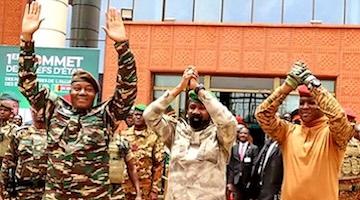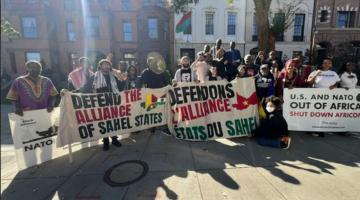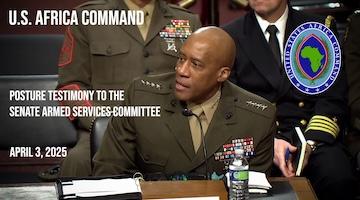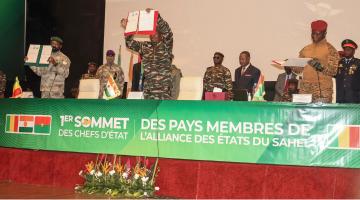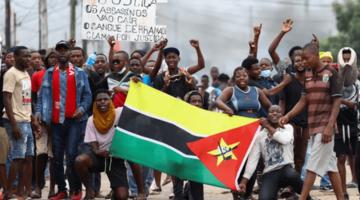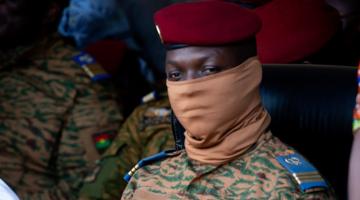Nigerien military leaders wave to supporters at the General Seyni Kountche Stadium in Niamey, Niger, Aug. 26, 2023. VOA
African Command's (AFRICOM) heavy-handed tactics in Africa have backfired, exposing U.S. arrogance and fueling a wave of resistance. As Sahel nations reject neocolonial bullying, Washington’s crumbling influence reveals the consequences of prioritizing militarism over mutual respect.
The deterioration of the U.S. Africa Command (AFRICOM) ’s security partnerships across the Alliance of Sahel States reveals a consistent pattern of U.S. diplomatic arrogance, with two recent explosive incidents exposing a growing rift between Washington and African leadership in the Confederation of Sahel States.
As the Trump administration moves to downgrade AFRICOM and slash diplomatic engagement, Niger’s defiance looks less like an outlier and more like a blueprint for African sovereignty. In March of 2024, the U.S. delegation to Niger, including Assistant Secretary of State Molly Phee and AFRICOM commander General Michael Langley, made a critical miscalculation during their March 12-13 meetings. Their “direct and frank” warnings about Niger's growing ties with Russia and Iran, including claims about a uranium deal with Tehran, backfired spectacularly. Within days, Niger revoked the military accord governing 1,000 U.S. personnel.
This outcome followed months of escalating tensions since Niger's July 2023 coup, during which the country had already expelled French forces while welcoming high-level Russian defense officials like Deputy Defense Minister Yunus-bek Yevkurov. The U.S. approach, demanding Niger abandon new partnerships while insisting on a leadership transition, proved completely incompatible with the Nigerien government’s sovereignty agenda.
Just over a year later, General Langley finds himself at the center of another diplomatic firestorm. During an April 3, 2025 Senate Armed Services Committee hearing, Langley suggested Burkina Faso was using mineral revenues and Chinese partnership funds to "maintain the regime in power" rather than benefit its people.
The Burkinabè response was swift and unequivocal. In an April 16 communiqué, the Foreign Ministry condemned Langley's "regrettable and gravely inaccurate" statements, calling them unfounded allegations that "misrepresent the country's reality." The government highlighted its extensive reforms in resource management and development programs, while proudly noting its military modernization through partnerships with China, Russia, and Turkey, a pointed rebuke to U.S. attempts to dictate its foreign relations.
AFRICOM erodes African nations’ sovereignty by ensuring that decisions related to security and development are heavily influenced by U.S. military and geopolitical interests. This weakens the ability of states to chart their own path toward self-determination, free from external interference. These moves by the governments in Niger and Burkina Faso indicate a willingness to cast off the shackles of neocolonialism.
Since the early 2000s, and especially after the formal establishment of AFRICOM in 2007, the U.S. has conducted drone strikes, air raids, and special forces operations across Somalia, targeting groups like al-Shabaab. These strikes are often launched without the full knowledge or consent of the Somali public or their elected representatives. The decision-making around these attacks is typically centralized in AFRICOM and the Pentagon, rather than in Mogadishu, sidelining Somali sovereignty and reducing the nation to a proxy battleground for U.S. strategic interests.
AFRICOM’s presence in Somalia has not led to long-term stability or peace. Instead, it has entrenched a state of perpetual conflict in which military solutions are prioritized over political and social development. The U.S. continues to deploy airstrikes that have killed not only alleged militants but also civilians, including women and children. AFRICOM has faced repeated criticism for underreporting these casualties and for failing to conduct transparent investigations when harm occurs. For Somali communities already traumatized by decades of war and foreign interference, these operations have fostered deep resentment and eroded trust in both their own government and external actors.
In addition to the physical violence, AFRICOM’s operations weaken the Somali government’s legitimacy. When military force is outsourced to a foreign power, the local government appears either complicit or powerless in the eyes of its people. This dynamic undermines efforts at national reconciliation, state-building, and the restoration of Somali control over its own territory. Rather than supporting Somali-led peacebuilding or investing in infrastructure, education, or healthcare, AFRICOM's presence militarizes the country's problems and diverts resources toward an endless war.
The U.S. military presence in Niger prior to March of 2024, anchored by AFRICOM, offers another clear example of how foreign military operations can impede African sovereignty. One of the most significant symbols of this presence was Air Base 201 in Agadez, a drone base built by the United States for over $100 million and operated by AFRICOM. Ostensibly designed to support counterterrorism missions across the Sahel, this base was established with minimal transparency and little public input from the Nigerien population. The strategic decisions around its construction and operation were made through elite-level agreements, bypassing democratic consultation and undermining Niger’s national sovereignty.
While framed as a partnership, the U.S. military presence often serves U.S. strategic interests more than the needs or desires of the local population. For example, the U.S. used Nigerien airspace and territory to carry out drone surveillance and potential strikes across West Africa, often without disclosing the full scope or consequences of these missions to the Nigerien public. This lack of accountability breeds distrust and resentment among the people, especially when military operations contribute to instability or civilian harm.
However, unlike relations with AFRICOM, where the U.S. and its allies attempted to reinforce Niger’s economic dependence on Western aid and military assistance, the partnership between Niger and Iran promotes development and could create positive outcomes for the Nigerien and Iranian people.
The U.S. diplomatic arrogance reveals the depth of Washington's strategic errors in Africa. In both cases, U.S. officials made serious allegations about African governance without presenting credible evidence, demonstrating a troubling disregard for diplomatic protocol. More fundamentally, they underestimated the fierce commitment of AES governments to assert their sovereignty after decades of what many in the region view as Western paternalism. The language used by U.S. officials, from Niger's complaint about “false allegations” to Burkina Faso's characterization of the remarks as “regrettable,” consistently struck the wrong tone, offending counterparts who expected to be treated as equals.
The consequences to the U.S. of these diplomatic failures have been far-reaching. The loss of critical counterterrorism bases in Niger has significantly weakened U.S. influence across the Sahel, while the rupture with Burkina Faso's government has left Washington in doubt about another partnership in a strategically vital region in the amidst of a serious shift in the U.S. approach to its engagement on the African continent.
The Trump administration's transactional approach to Africa has initiated a dramatic drawdown of diplomatic engagement, marked by embassy closures, aid reductions, and the dismantling of development institutions like USAID. This retreat from traditional diplomatic channels represents the most significant shift in U.S.-Africa relations in decades, even as Congress has all but rejected the administration's parallel proposal to merge AFRICOM with European Command.
The consequences of this diplomatic disengagement are already apparent. Without the soft power tools of aid and development, the U.S. is increasingly reliant on military channels to maintain influence. The administration's approach effectively cedes diplomatic leadership to Pentagon factions, prioritizing airstrikes and security partnerships over statecraft. This militarized pivot comes at a precarious moment, as Russia and China expand their economic and security footholds across the continent.
For AFRICOM, this restructuring could mean a loss of autonomy, reduced resources, and diminished strategic focus. The Trump administration appears poised to accelerate militarization while abandoning the diplomatic and developmental tools needed to sustain influence. The reality is that retrenchment won’t end U.S. military involvement. It will just make it more disorganized and reactive. With Congress resisting the merger, the administration’s gamble risks weakening the U.S. position on the African continent.
This shift aligns with a broader disdain of the current U.S. administration for multilateralism and long-term engagement. By closing embassies, cutting aid, and considering downgrading AFRICOM, his administration is effectively outsourcing U.S. policy to the Pentagon’s most hawkish factions. The result will be a cycle of militarized interventions, deepening anti-U.S resentment, and further erosion of U.S. leverage.
Tunde Osazua is the National Co-Coordinator of the Black Alliance for Peace and a member of the Steering Committee of the International Campaign to Free Kamau Sadiki.

